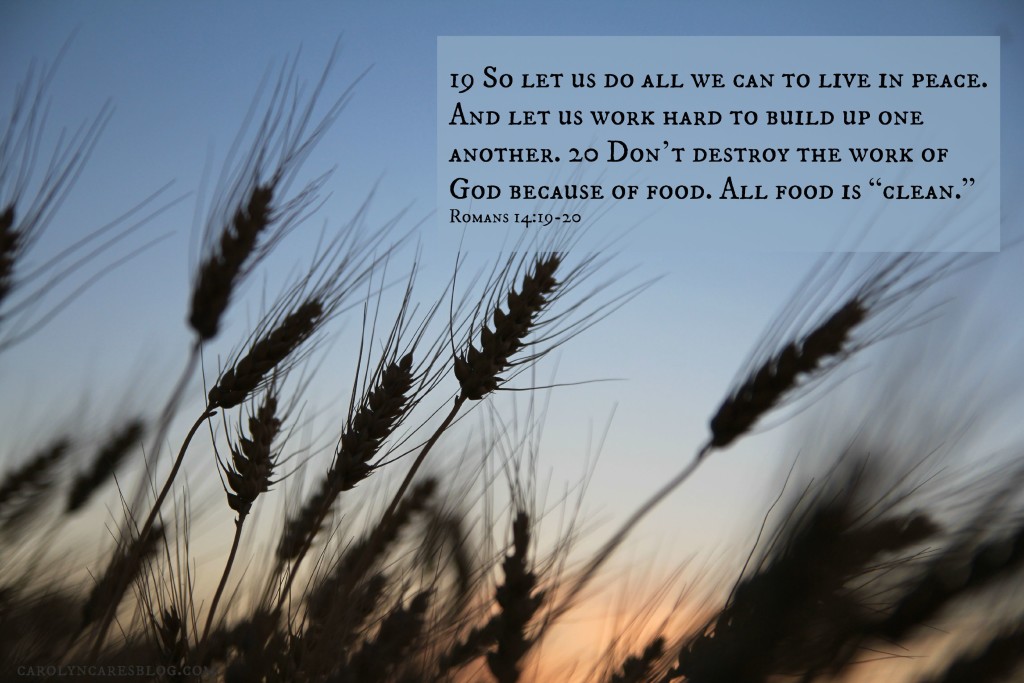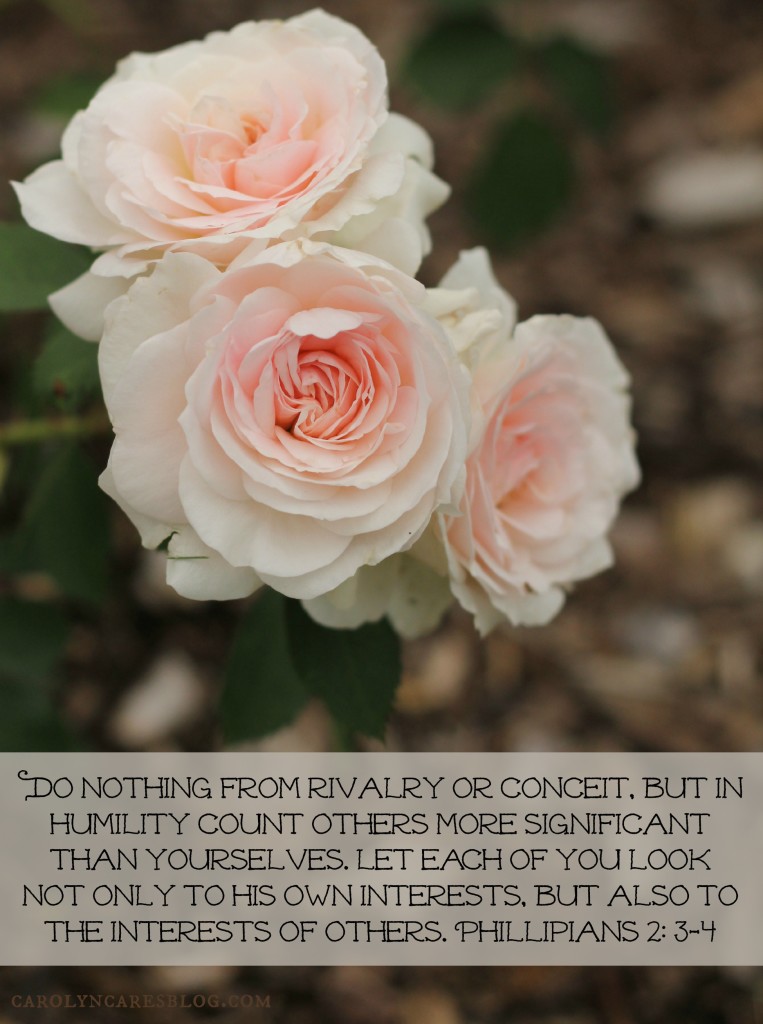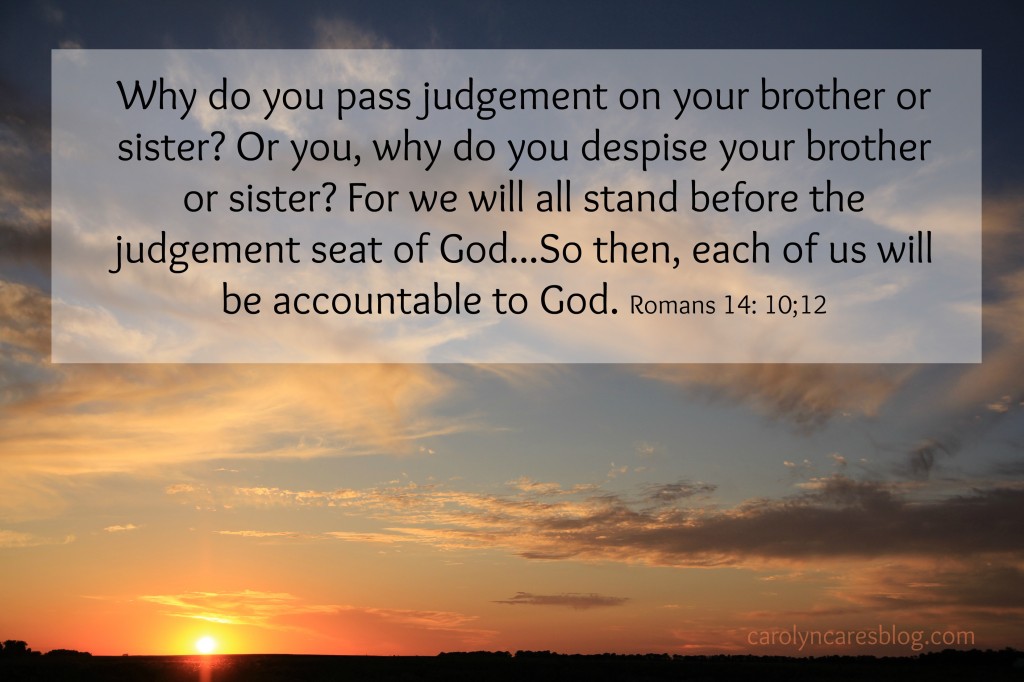As I was trying to decide how to write what was on my heart regarding all the arguments around food choices, I came across this passage which pretty much summed up what I was feeling. I would encourage you to read the whole thing, even though it’s a bit long. This version put it in everyday language, but the basic meaning matches the 3 other translations I read.
Romans 14 (The Message)
Cultivating Good Relationships
14 Welcome with open arms fellow believers who don’t see things the way you do. And don’t jump all over them every time they do or say something you don’t agree with—even when it seems that they are strong on opinions but weak in the faith department. Remember, they have their own history to deal with. Treat them gently.
2-4 For instance, a person who has been around for a while might well be convinced that he can eat anything on the table, while another, with a different background, might assume he should only be a vegetarian and eat accordingly. But since both are guests at Christ’s table, wouldn’t it be terribly rude if they fell to criticizing what the other ate or didn’t eat? God, after all, invited them both to the table. Do you have any business crossing people off the guest list or interfering with God’s welcome? If there are corrections to be made or manners to be learned, God can handle that without your help.
5 Or, say, one person thinks that some days should be set aside as holy and another thinks that each day is pretty much like any other. There are good reasons either way. So, each person is free to follow the convictions of conscience.
6-9 What’s important in all this is that if you keep a holy day, keep it for God’s sake; if you eat meat, eat it to the glory of God and thank God for prime rib; if you’re a vegetarian, eat vegetables to the glory of God and thank God for broccoli. None of us are permitted to insist on our own way in these matters. It’s God we are answerable to—all the way from life to death and everything in between—not each other. That’s why Jesus lived and died and then lived again: so that he could be our Master across the entire range of life and death, and free us from the petty tyrannies of each other.
10-12 So where does that leave you when you criticize a brother? And where does that leave you when you condescend to a sister? I’d say it leaves you looking pretty silly—or worse. Eventually, we’re all going to end up kneeling side by side in the place of judgment, facing God. Your critical and condescending ways aren’t going to improve your position there one bit. Read it for yourself in Scripture:
“As I live and breathe,” God says,
“every knee will bow before me;
Every tongue will tell the honest truth
that I and only I am God.”So tend to your knitting. You’ve got your hands full just taking care of your own life before God.
13-14 Forget about deciding what’s right for each other. Here’s what you need to be concerned about: that you don’t get in the way of someone else, making life more difficult than it already is. I’m convinced—Jesus convinced me!—that everything as it is in itself is holy. We, of course, by the way we treat it or talk about it, can contaminate it.
15-16 If you confuse others by making a big issue over what they eat or don’t eat, you’re no longer a companion with them in love, are you? These, remember, are persons for whom Christ died. Would you risk sending them to hell over an item in their diet? Don’t you dare let a piece of God-blessed food become an occasion of soul-poisoning!
17-18 God’s kingdom isn’t a matter of what you put in your stomach, for goodness’ sake. It’s what God does with your life as he sets it right, puts it together, and completes it with joy. Your task is to single-mindedly serve Christ. Do that and you’ll kill two birds with one stone: pleasing the God above you and proving your worth to the people around you.
19-21 So let’s agree to use all our energy in getting along with each other. Help others with encouraging words; don’t drag them down by finding fault. You’re certainly not going to permit an argument over what is served or not served at supper to wreck God’s work among you, are you? I said it before and I’ll say it again: All food is good, but it can turn bad if you use it badly, if you use it to trip others up and send them sprawling. When you sit down to a meal, your primary concern should not be to feed your own face but to share the life of Jesus. So be sensitive and courteous to the others who are eating. Don’t eat or say or do things that might interfere with the free exchange of love.
22-23 Cultivate your own relationship with God, but don’t impose it on others. You’re fortunate if your behavior and your belief are coherent. But if you’re not sure, if you notice that you are acting in ways inconsistent with what you believe—some days trying to impose your opinions on others, other days just trying to please them—then you know that you’re out of line. If the way you live isn’t consistent with what you believe, then it’s wrong.
I encourage all of you to really think about how we treat our family and friends when it comes to their food choices. If we ridicule them, or shame them, or make them look bad on social media or at the coffee shop, we are not pleasing God. He knows what’s in our hearts, and certainly knows what comes out of our mouths…or keyboards. As it says in the passage above, “Eventually, we’re all going to end up kneeling side by side in the place of judgment, facing God. Your critical and condescending ways aren’t going to improve your position there one bit.” Let’s work on building each other up, and showing Jesus’ love through our words and our actions.







